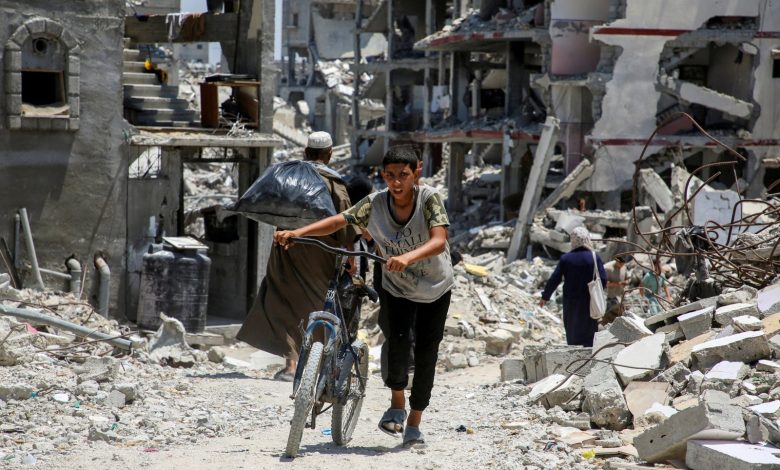UAE proposes ‘temporary int’l mission’ to restore order in Gaza

The United Arab Emirates (UAE) called Thursday for a “temporary international mission” to restore order and address the humanitarian crisis in Gaza.
Arab heads of state called at a summit in May for the deployment of United Nations peacekeepers across the occupied Palestinian territories, an idea strongly opposed by Israel.
The announcement on Thursday comes amid ongoing Western and Arab discussions about post-war Gaza, which has been ravaged by a destructive Israeli war for the past ten months.
“Consolidating peace and security and ending the humanitarian suffering should begin by the deployment of a temporary international mission in Gaza with a formal invitation from the Palestinian government,” UAE Minister of State for International Cooperation Reem al-Hashimy told the official WAM news agency.
“This international mission will be responsible for efficiently responding to the humanitarian crisis… establishing law and order… and paving the way to reunite Gaza and the West Bank under a single, legitimate Palestinian Authority,” she said.
Her comments came days after Deputy Foreign Minister Lana Nusseibeh told the British newspaper The Financial Times that “the UAE could consider being part of the stabilization forces alongside Arab and international partners… at the invitation of a reformed Palestinian Authority.”
Israeli Prime Minister Benjamin Netanyahu has said little about his plans for post-war Gaza, but in a speech to the U.S. Congress on Wednesday, he said Israel should retain control of security matters while Palestinian figures acceptable to Israel administered civil affairs.
Washington has repeatedly said that it opposes the post-war government of Gaza by either Israel or the Palestinian resistance group Hamas and has called for a reformed Palestinian Authority to take charge instead.
The Palestinian Authority has had no presence in Gaza since Hamas seized sole control of the territory in 2007.
It exercises limited powers in Palestinian towns and cities in the Israeli-occupied West Bank. Israel controls access to Gaza.
Flouting a U.N. Security Council resolution demanding an immediate cease-fire, Israel has faced international condemnation amid its continued brutal offensive on Gaza since an Oct. 7 attack by Hamas.
Nearly 39,200 Palestinians have since been killed, mostly women and children, and over 90,400 injured, according to local health authorities.
Vast tracts of Gaza lie in ruins amid a crippling blockade of food, clean water, and medicine.
Israel is accused of genocide at the International Court of Justice, which ordered Tel Aviv to immediately halt its military operation in the southern city of Rafah, where more than 1 million Palestinians had sought refuge from the war before it was invaded on May 6.
Post-war plan
Separately, the top U.S. general said on Thursday Israel still has not shared much of its “day after” planning for Gaza once the war ends.
Netanyahu’s speech on Wednesday sketched only a vague outline for the Palestinian enclave.
“There’s not a lot of detail that I’ve been able to see from a plan from them,” Air Force General C.Q. Brown, chairman of the Joint Chiefs of Staff, told a Pentagon news conference. “This is something that we’ll continue to work with them on.”
For months, Washington has repeatedly urged Israel to craft a realistic post-war plan for Gaza and warned that the absence of it could trigger lawlessness and chaos.
“As far as the day after, we have talked to the Israelis about this, how to make a transition. We’ve talked to them a number of times,” Brown said.
Later on Thursday, State Department spokesperson Matthew Miller said Israel had not put forward a great amount of detail about a plan for the day after, but conversations continued.
“We have been having conversations with them about this and they are in a different place than they were several months ago when they hadn’t really thought about a day after at all,” Miller added.
“We are at the point where we’re talking with them and they’re putting forward some ideas,” he added.
Palestinians have previously said only an end to Israeli occupation and the creation of a Palestinian state will bring peace.
But in his speech to Congress, Netanyahu made no mention of creating a pathway to Palestinian statehood following the war in Gaza. That is something he and his far-right coalition partners have staunchly opposed even as the Biden administration has pushed Israel to give ground on the issue.
Netanyahu stopped short of ruling out a role for the Palestinian Authority, whose place in a future two-state solution is favored by the Biden administration but opposed by Netanyahu’s coalition partners.






